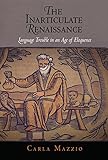The Inarticulate Renaissance : Language Trouble in an Age of Eloquence / Carla Mazzio.
Material type: TextPublisher: Philadelphia : University of Pennsylvania Press, [2016]Copyright date: ©2009Description: 1 online resource (360 p.) : 5 illusContent type:
TextPublisher: Philadelphia : University of Pennsylvania Press, [2016]Copyright date: ©2009Description: 1 online resource (360 p.) : 5 illusContent type: - 9780812241389
- 9780812293401
- Eloquence in literature
- English language -- Early modern, 1500-1700 -- History
- English literature -- Early modern, 1500-1700 -- History and criticism
- Speech and social status -- England -- History -- 16th century
- LITERARY CRITICISM / European / English, Irish, Scottish, Welsh
- Cultural Studies
- Literature
- Medieval and Renaissance Studies
- 820.9/003
- PR418.E45 M39 2009eb
- online - DeGruyter
- Issued also in print.
| Item type | Current library | Call number | URL | Status | Notes | Barcode | |
|---|---|---|---|---|---|---|---|
 eBook
eBook
|
Biblioteca "Angelicum" Pont. Univ. S.Tommaso d'Aquino Nuvola online | online - DeGruyter (Browse shelf(Opens below)) | Online access | Not for loan (Accesso limitato) | Accesso per gli utenti autorizzati / Access for authorized users | (dgr)9780812293401 |
Browsing Biblioteca "Angelicum" Pont. Univ. S.Tommaso d'Aquino shelves, Shelving location: Nuvola online Close shelf browser (Hides shelf browser)

|

|

|

|

|

|

|
||
| online - DeGruyter Tea Sets and Tyranny : The Politics of Politeness in Early America / | online - DeGruyter Frontier Country : The Politics of War in Early Pennsylvania / | online - DeGruyter "The Man Who Thought Himself a Woman" and Other Queer Nineteenth-Century Short Stories / | online - DeGruyter The Inarticulate Renaissance : Language Trouble in an Age of Eloquence / | online - DeGruyter Raphael Lemkin and the Concept of Genocide / | online - DeGruyter Entangled Histories : Knowledge, Authority, and Jewish Culture in the Thirteenth Century / | online - DeGruyter Order and Chivalry : Knighthood and Citizenship in Late Medieval Castile / |
Frontmatter -- Contents -- List of Illustrations -- Note on The Text -- Introduction -- Chapter One. The Renaissance of Mumbling -- Chapter Two. From Fault to Figure -- Chapter Three. Disarticulating Community -- Chapter Four. Acting in the Passive Voice -- Chapter Five. Feeling Inarticulate -- Notes -- Selected Bibliography -- Index -- Acknowledgments
restricted access online access with authorization star
http://purl.org/coar/access_right/c_16ec
The Inarticulate Renaissance explores the conceptual potential of the disabled utterance in the English literary Renaissance. What might it have meant, in the sixteenth-century "age of eloquence," to speak indistinctly; to mumble to oneself or to God; to speak unintelligibly to a lover, a teacher, a court of law; or to be utterly dumfounded in the face of new words, persons, situations, and things? This innovative book maps out a "Renaissance" otherwise eclipsed by cultural and literary-critical investments in a period defined by the impact of classical humanism, Reformation poetics, and the flourishing of vernacular languages and literatures.For Carla Mazzio, the specter of the inarticulate was part of a culture grappling with the often startlingly incoherent dimensions of language practices and ideologies in the humanities, religion, law, historiography, print, and vernacular speech. Through a historical analysis of forms of failed utterance, as they informed and were recast in sixteenth-century drama, her book foregrounds the inarticulate as a central subject of cultural history and dramatic innovation. Playwrights from Nicholas Udall to William Shakespeare, while exposing ideological fictions through which articulate and inarticulate became distinguished, also transformed apparent challenges to "articulate" communication into occasions for cultivating new forms of expression and audition.
Issued also in print.
Mode of access: Internet via World Wide Web.
In English.
Description based on online resource; title from PDF title page (publisher's Web site, viewed 24. Apr 2022)


